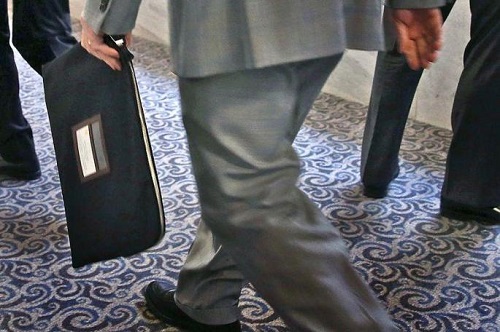By
Ricardo Swire
Modern society’s instant communication provided by mobile phones, encrypted emails, face-to-face video conferencing and other digital platforms, makes the idea of a physical bag to relay confidential documents and materials between countries seem antiquated. Nevertheless, the ancient custom remains a hallmark of international relations. The Vienna Convention gave diplomatic pouches and couriers inviolable status.
Over the years criminal and terrorist organizations’ sophistication made diplomatic pouches a security threat, the illegal transport of radiological/nuclear materials a national security concern. Credible evidence outlined diplomatic pouches that smuggled drugs, weapons and cash. In one noteworthy instance Nigerian government operatives tried to kidnap, drug and transport the exiled former Transportation Minister back to Nigeria via a diplomatic crate. Fortunately a vigilant customs officer was alerted by a strong chemical smell emanating from the cargo that was loaded on a Lagos bound commercial flight.
The cargo’s containers were declared as diplomatic pouches, but did not bear requisite markings authenticating them as official diplomatic bags. Traditionally the special pouches were bags similar to “canvas sacks.” Genuine diplomatic pouches carry a “mark of their character.” It is clearly labelled “Diplomatic Pouch” with the sending entity’s seal affixed. A plastic seal is attached to a tie that formally closes the pouch. The Vienna Convention does not limit size or weight of pouches/containers displaying diplomatic markings and official seals.
The regulation prohibits transportation of any object inside diplomatic bags not intended for official use. Conversely such pouches and contents are sacrosanct. They are exempt non-invasive security procedures such as metal detectors, electronic scanning or canine sniffing. No known lawful method, for a host country’s customs authorities to ascertain if diplomatic bags are utilized for illegitimate purposes, exists. The system is based exclusively on “good-faith.”
The honourable practice has no meaning among unprincipled criminal organizations. In one security breach Italian Carabinieri or police assigned to Milan intercepted forty kilos of cocaine, smuggled via Ecuador’s Ministry of Foreign Affairs diplomatic pouch. The drug valued more than €2 million. Traffickers hid the cocaine in vases that were supposed to be stage props in an Ecuadorian theatrical play. Not long before Ecuadorian government had made a provision in the Official Register No.212 to introduce “extraordinary diplomatic pouches.” Such bags can contain objects such as works of art and crafts. Objects not for official use and therefore not required to carry a waybill.
Official diplomatic pouch couriers travel first class. Black diplomatic passports guarantee smooth, uninterrupted travel. They are first to board the aircraft, first to deplane. The bright orange diplomatic pouch usually camouflaged inside a regular bag. In another noted illegal breach the United Nations headquarters’ security team in New York City stopped sixteen kilos of cocaine. The unaddressed white bag was emblazoned with an unconvincing rendering of the organization’s logo. It was also made of different material to standard UN diplomatic pouches.
The drug satchel arrived at the UN’s NYC mail sorting facility from Mexico City via Cincinnati. Inside the imitation official bag hollowed-out notebooks accommodated the cocaine consignment. In February 2018 Argentine Federal Police interrupted three hundred and eighty-nine kilos of cocaine worth US$61 million. A one year probe monitored high-quality cocaine movements to Europe, through the Russian Embassy’s diplomatic courier service in Buenos Aires.
The diplomatic pouch inviolability, provided by international legislation, adds to challenges faced by national security officials charged with preventing chemical weapons trafficking, drugs smuggling and terrorism. But despite the inherent risks unscreened diplomatic bags may contain objects or materials designed to cause harm or circumvent laws, little political appetite to change the established system exists.
Ricardo Swire
Ricardo Swire is the Principal Consultant at R-L-H Security Consultants & Business Support Services and writes on a number of important issues.



No Comments Yet!
You can be first to comment this post!